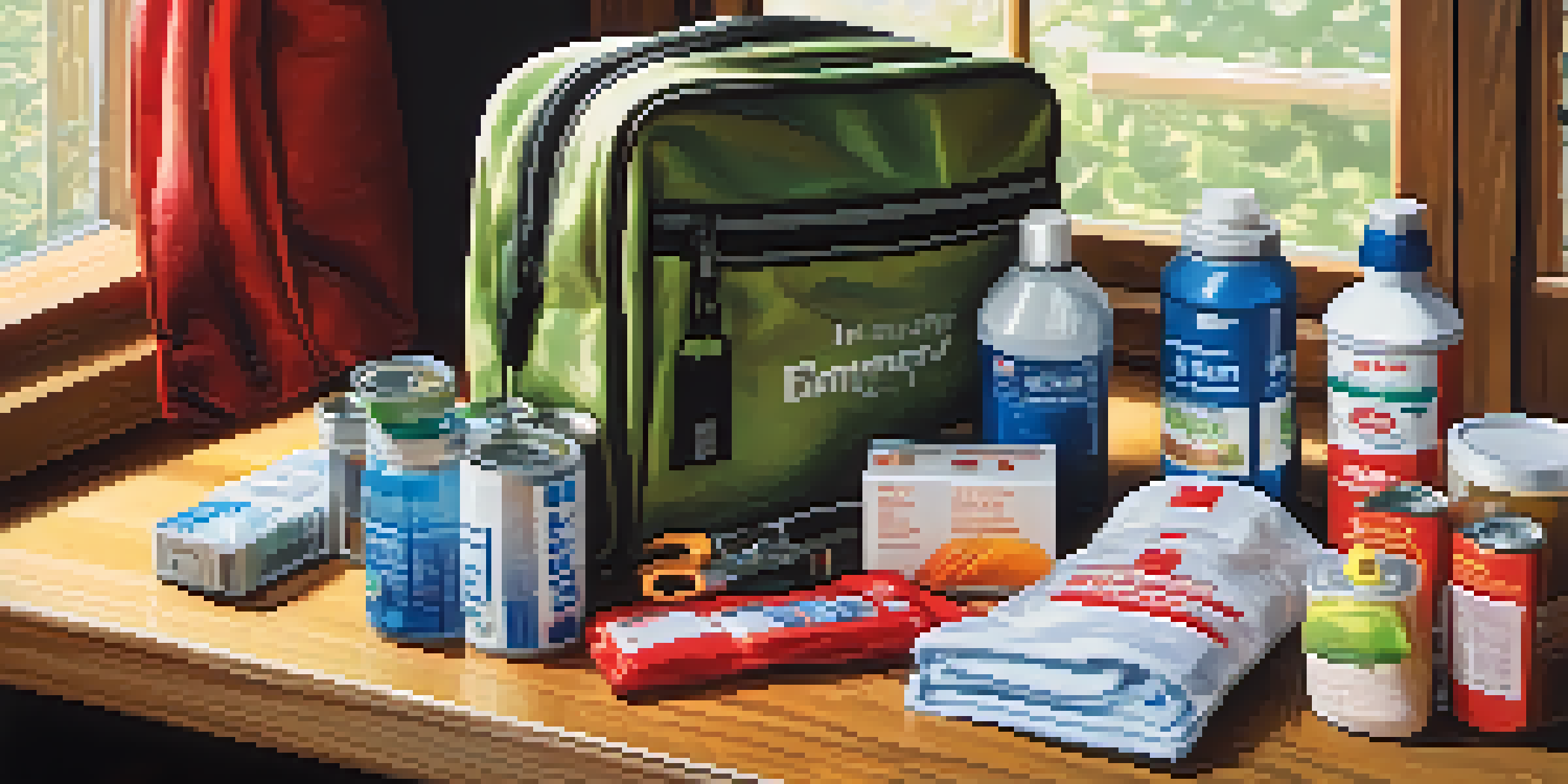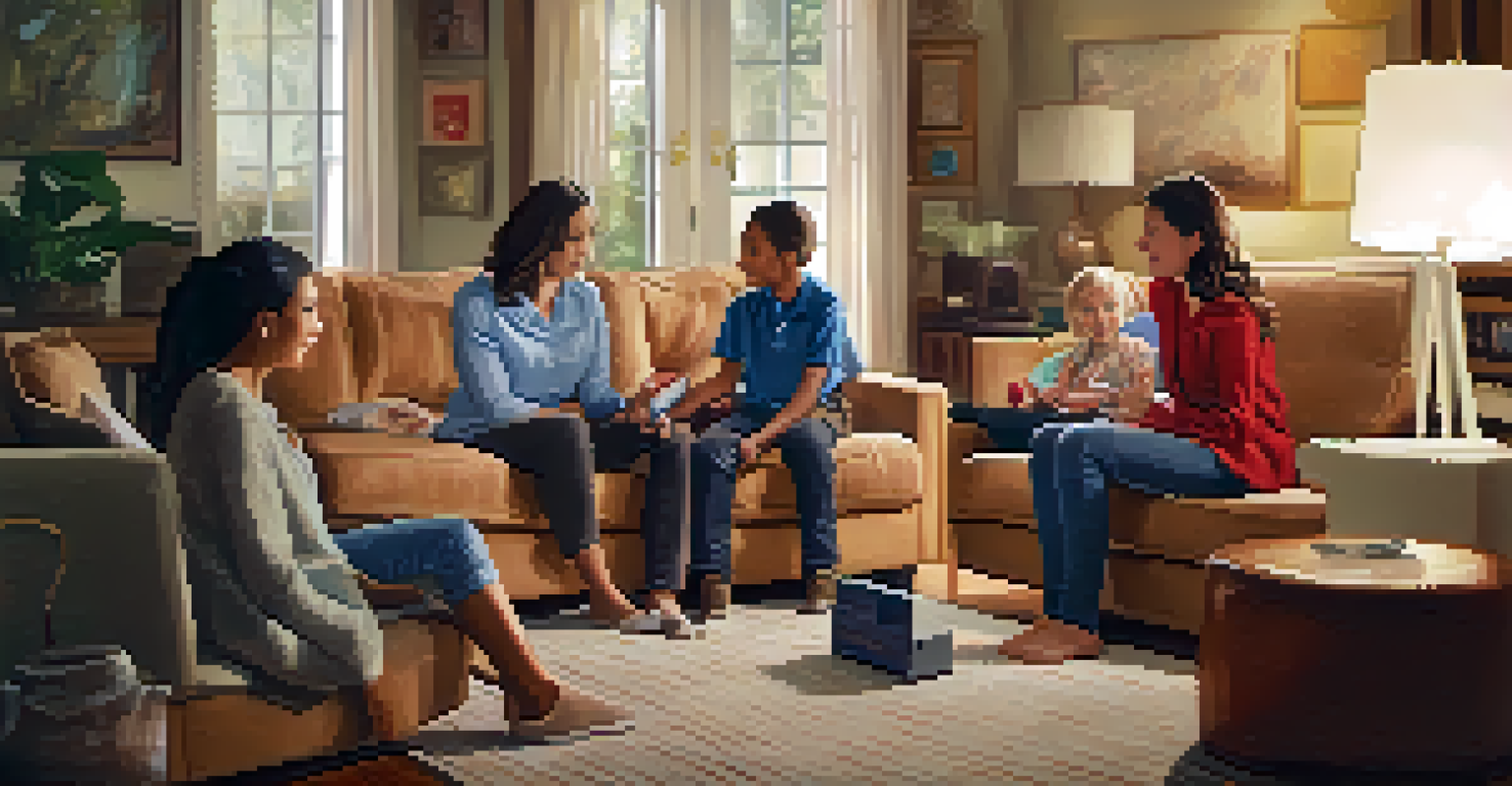Top Emergency Kits Every Household Should Have Ready

Understanding the Importance of Emergency Kits
Emergency kits are vital for preparedness in unexpected situations. They provide essential supplies that can help you respond effectively during emergencies like natural disasters or power outages. Having a well-stocked emergency kit can mean the difference between chaos and calm in a crisis.
By failing to prepare, you are preparing to fail.
Think of your emergency kit as your safety net. Just as you wouldn’t jump into a pool without checking the water first, being unprepared for emergencies can lead to unnecessary stress and risk. By taking the time to assemble these kits, you’re not just gathering supplies; you’re investing in your peace of mind.
Moreover, emergencies can strike at any time, so it’s crucial to have your kit ready long before you need it. Whether it’s a severe storm, an earthquake, or a sudden illness, knowing you have what you need can help you stay focused and make better decisions under pressure.
Basic Emergency Kit Essentials for Every Household
Every household should have a basic emergency kit, which typically includes water, non-perishable food, a flashlight, and a first aid kit. These essentials serve as your foundation for survival in the event of an emergency. It's recommended to have at least one gallon of water per person per day for three days.

In addition to food and water, don’t forget to pack a battery-operated or hand-crank radio. This will help you stay informed about emergency updates, especially if the power goes out. A multi-tool or Swiss army knife can also be a lifesaver, offering various functions in a single compact package.
Emergency Kits Ensure Preparedness
Having well-stocked emergency kits can greatly enhance your ability to respond effectively during crises.
Lastly, include personal hygiene items and any necessary medications. Keeping your basic emergency kit stocked and accessible can empower you to handle crises more effectively.
Creating a First Aid Kit Tailored to Your Needs
A well-stocked first aid kit is crucial for addressing injuries and illnesses that may occur during emergencies. Start with the basics: adhesive bandages, antiseptic wipes, gauze, and pain relievers. These items can manage minor injuries and provide immediate care when needed.
The time to repair the roof is when the sun is shining.
Consider the specific needs of your household when customizing your first aid kit. For example, if you have children or pets, you may need child-specific medications or pet first aid supplies. Including any prescriptions or medical supplies that family members rely on is also important.
Regularly check and update your first aid kit, replacing expired items and adding new ones as your family’s needs change. This way, you’ll ensure that you’re always prepared for any eventuality.
Specialized Kits for Families with Unique Needs
Some households have unique needs that require specialized emergency kits. For instance, families with infants should have a kit that includes baby formula, diapers, and other essentials. Similarly, elderly family members might need specific medications or mobility aids included.
If you have pets, don’t forget their needs as well. A pet emergency kit should include food, water, a leash, and any medications your furry friends take. Preparing for all family members, including pets, ensures that everyone is cared for during emergencies.
Customize Kits for Unique Needs
Tailoring emergency kits to meet the specific needs of your household, including children and pets, ensures comprehensive preparedness.
Assess your family’s specific circumstances and customize your kits accordingly. This proactive approach will make you feel more secure and prepared when disaster strikes.
Emergency Kits for Vehicle Safety
Don’t overlook the importance of having an emergency kit in your vehicle. Being prepared while on the road can help you handle unexpected situations like breakdowns or accidents. Basic items to include are jumper cables, a spare tire, and a basic tool kit.
Consider adding roadside flares or reflective triangles to make your vehicle more visible to passing drivers. A blanket and some non-perishable snacks can also be lifesavers if you find yourself stranded for an extended period.
Be sure to check your vehicle emergency kit regularly, ensuring that everything is in working order and that food and water are fresh. This small step can provide you with peace of mind every time you hit the road.
Storing Your Emergency Kits Safely and Effectively
The way you store your emergency kits can significantly affect their usefulness. Choose a cool, dry place for storage, away from direct sunlight and moisture. Clear plastic bins or backpacks can help organize items and make them easy to grab in an emergency.
Label your kits clearly, so everyone in the household knows where to find them. Consider storing them in multiple locations, such as one at home and one in your vehicle, for added convenience.
Regular Maintenance is Key
Consistently reviewing and updating your emergency kits helps maintain their effectiveness and ensures readiness for any situation.
Regularly review and refresh your kits to ensure that everything is in good condition and that you have what you need. This simple routine will keep your emergency supplies ready for action when you need them most.
Educating Your Family About Emergency Preparedness
Having emergency kits is only part of the equation; educating your family about their use is equally important. Conduct family drills to practice what to do in various emergency scenarios. This hands-on experience can boost confidence and help everyone remember their roles during a crisis.
Take time to discuss the contents of your emergency kits and explain their importance. Ensure that each family member knows where the kits are stored and how to access them quickly. This shared knowledge can foster a sense of teamwork and preparedness.

Encouraging open conversations about emergencies can also help alleviate fears. The more prepared and informed your family feels, the more equipped they’ll be to handle any situation that arises.
Maintaining Your Emergency Kits for Optimal Readiness
Maintaining your emergency kits is crucial for ensuring their effectiveness. Set a regular schedule, perhaps every six months, to review and update your supplies. Check for expired items, restock any missing essentials, and revise the kit based on any changes in your family’s needs.
Consider seasonal changes that might necessitate different supplies. For example, during winter, you might want to include extra blankets or hand warmers. Similarly, summer kits might benefit from sunscreen and insect repellent.
By keeping your kits fresh and relevant, you’ll ensure that you’re always ready to respond to emergencies with confidence. A little maintenance goes a long way in enhancing your family’s safety.